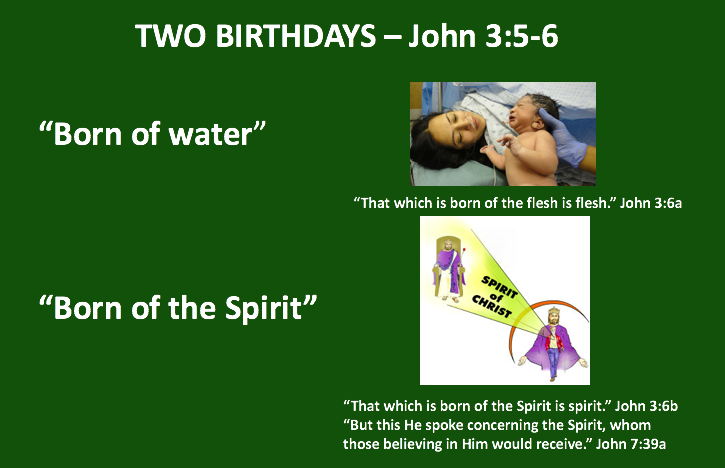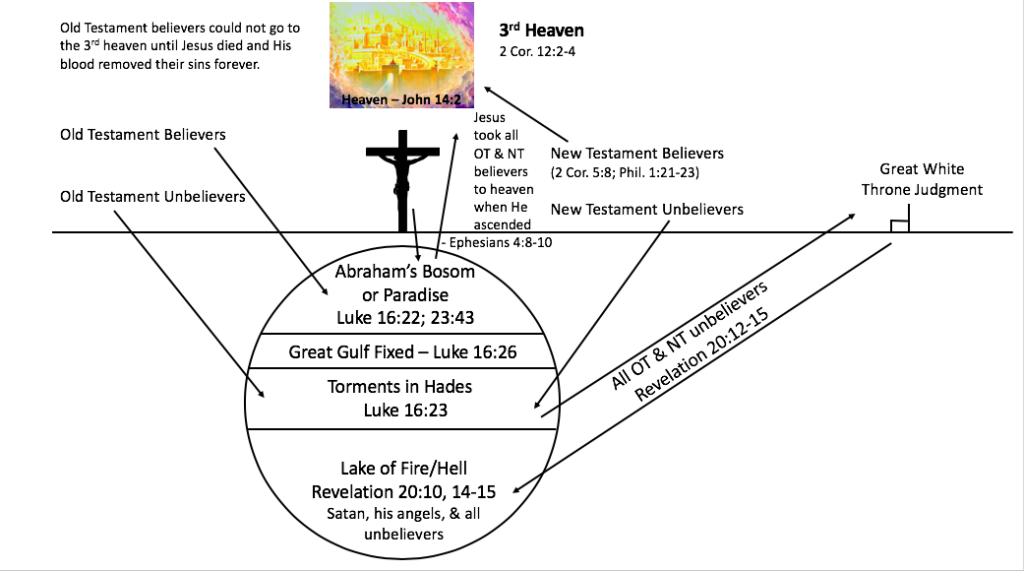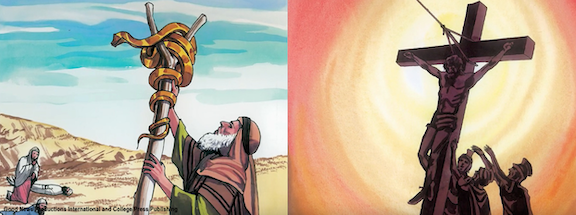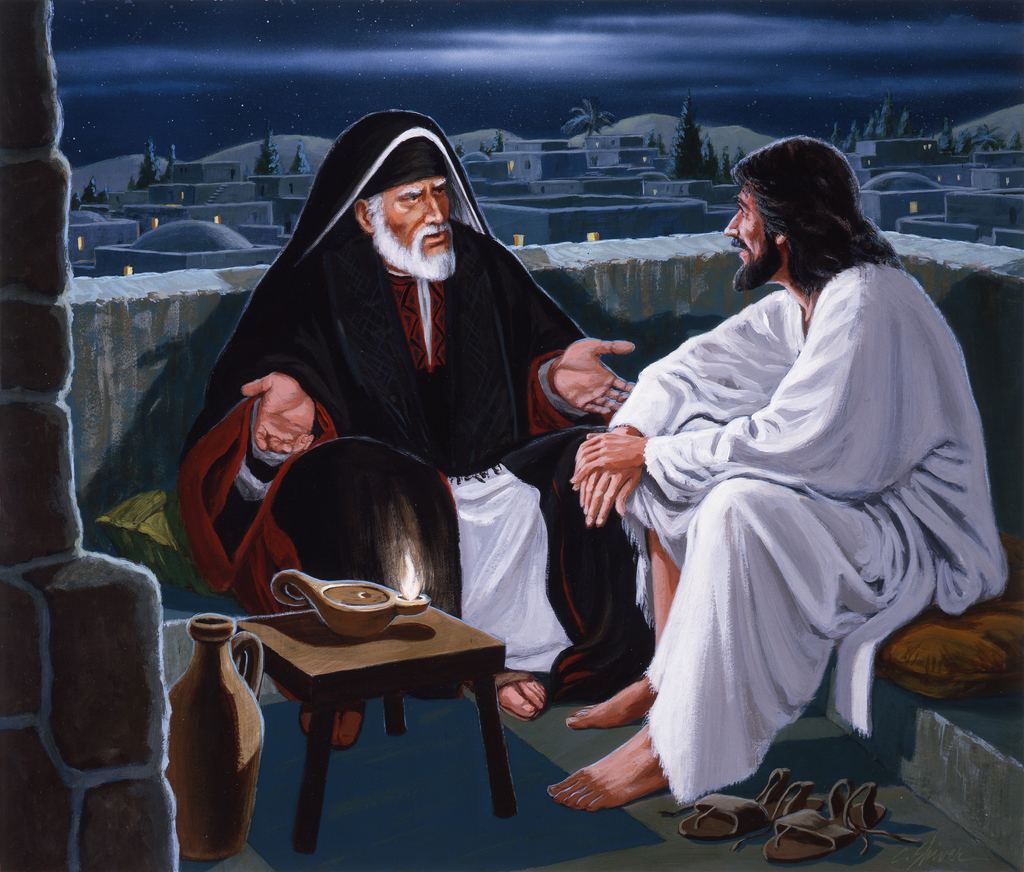“14 And as Moses lifted up the serpent in the wilderness, even so must the Son of Man be lifted up, 15 that whoever believes in Him should not perish but have eternal life.” John 3:14-15
After a long illness, a woman died and arrived at the Gates of Heaven. While she was waiting for Saint Peter to greet her, she peeked through the Gates. She saw a beautiful banquet table. Sitting all around were her parents and all the other people she had loved and who had died before her. They saw her and began calling greetings to her:
“Hello. How are you? We’ve been waiting for you. Good to see you.” When Saint Peter came by, the woman said to him, “This is such a wonderful place. How do I get in?” “You have to spell a word,” Saint Peter told her. “Which word?” the woman asked. “Love.” The woman correctly spelled “l-o-v-e,” and Saint Peter welcomed her into Heaven.
About two years later, Saint Peter came to the woman and asked her to watch the Gates of Heaven for him that day. While the woman was guarding the Gates of Heaven, her husband arrived “I’m surprised to see you,” the woman said. “How have you been?” “Oh, I’ve been doing pretty well since you died,” her husband told her. “I married the beautiful young nurse who took care of you while you were ill. And then I won the lottery. I sold the little house you and I lived in and bought a big mansion. And my wife and I traveled all around the world. We were on vacation, and I went water skiing today. I fell, the ski hit my head, and here I am. How do I get in?” “You have to spell a word,” the woman told him.
“Which word?” her husband asked. “Czechoslovakia…” [1]
We have all heard jokes about people showing up at the Pearly Gates seeking entrance into heaven. While many of these jokes bring a smile to our faces, behind most of them is the false assumption that we must do something to get into heaven. It is shocking to people to hear that they can’t do anything to earn entrance into God’s heaven. God’s grace goes beyond human comprehension. By our nature, we want to earn God’s favor.
Have you ever talked to someone about the Lord and have him tell you how religious he is? Or did you ever witness to someone and have the person inform you that he felt he had to work his way to heaven by being good? How do you respond to that? Or did you ever present the gospel to someone only to have them say, “I believe all of that,” even though you sensed he didn’t really understand?
How are we to reach a religious person who thinks he is already saved when he is not? Jesus teaches us by example in John 3:1-15. In this passage, Jesus speaks with a person who had a difficult time understanding the truth of free grace salvation. His name was Nicodemus, and as we move through our text, we will discover that Nicodemus was a very religious man who had a hard time realizing the difference between religion and relationship. Let’s listen in on his conversation with Jesus.
The first way to approach a religious person about Christ is to CONFRONT HIM WITH THE TRUTH (3:1-12). 3:1: In John 2:23-25 we saw new believers whom Jesus did not entrust Himself to at first because they were not trustworthy. They were not willing to openly confess their relationship with Jesus like some of the believing Pharisees in John 12:42-43. It is reasonable to conclude that the apostle John is now going to tell us how one of those Pharisees comes to faith in Jesus. [2]
“John skillfully repeats the word man in 2:25 and 3:1. Immediately after the words, ‘He knew what was in man’ (2:25), John says, ‘Now there was a man…’ (3:1). The new believers in 2:23 were like the man who came to Jesus under the cloak of darkness (3:2).
“John the Baptist is the paradigm of the open believer (cf. 3:22-36); Nicodemus is the paradigm of the secret believer (3:1-21). Every time John mentions Nicodemus, he writes that he came to Jesus by night (3:2; 7:50; 19:39). Night is a symbol of darkness and of secrecy. There are hints in 7:45-52 and certainly in 19:38-42 that Nicodemus believed in Jesus, though without openly confessing Him.” [3]
He was “a man of the Pharisees,”a very religious man. Many religious people believe in God. Many believe in angels. Many of them believe Christ was raised from the dead. Like many religious people today, the Pharisees believed the Old Testament, angels, and the resurrection. They were conservatives. They had points to ponder in their head, and a passion in their hearts. They possessed a tremendous zeal for the law. The Pharisees gave their lives to studying and obeying the Law and traditions. Like the Pharisees, many religious people in the world today share our presuppositions – there is a God, the Bible is inspired, Jesus is the Son of God. But they don’t have a relationship with the Lord.
Nicodemus was also a “ruler of the Jews.”He was a member of the Sanhedrin, [4] which “served as Israel’s Parliament/Congress and Supreme Court.” [5] The Sanhedrin was “a ruling body among the Jews consisting of scholarly scribes, elders, and the priestly aristocracy. According to the Mishna (Sanhedrin 1:6), there were seventy-one members in the Sanhedrin. It was empowered to preserve the Torah and served as the final court of appeal in matters of debated interpretation. The Sanhedrin was authorized to excommunicate any persons in violation of Jewish law and to conduct trials of false prophets and rebellious elders. This body retained power in religious and limited civil jurisdiction until the fall of Jerusalem to the Romans (A.D. 70).” [6]
“He would have stressed the careful observance of Israel’s laws and the traditions of the elders. Obedience to these was the way of salvation for Pharisees.” [7]
From a Jewish perspective, Nicodemus had it all. He was wealthy, well-respected, and admired among the Jewish people.
3:2a: This is where Nic at Nite comes from. [8] There has been a lot of speculation as to why Nicodemus came at “night.” Rabbis studied at night. He did this to avoid the crowd or so their conversation would not be interrupted. Perhaps he was afraid to be seen with Jesus by his colleagues, especially in light of Christ’s recent cleansing of the temple. [9] In John’s gospel, darkness opposes light. Perhaps the mention of the fact it was night symbolizes the darkness of sin and shame that shrouded Nicodemus’ heart and soul. [10]
Some of us may be like Nicodemus who tried to medicate his brokenness and shame with religion and did not even realize it. We may see God as a perfectionistic deity that we must appease with our religious performance. And yet, no matter how hard we try, we cannot measure up to His standards which causes us to have more shame. And so, we work harder, trying to please Him. And it is difficult for us to experience Christ’s love and forgiveness for us.
But for whatever reason, Nicodemus comes at night in hopes that this miracle worker can answer some of his spiritual questions. He was a seeker.
3:2b: Nicodemus also has a deep respect and interest in Jesus. His designation of Jesus as “Rabbi” shows great admiration for Christ as a teacher. [11] After all, he is a trained religious ruler and Jesus is only a commoner. Nicodemus even recognizes Jesus’ divine origin. “We know that You are a teacher come from God; for no one can do these signs that You do unless God is with him.” The miraculous “signs” of Jesus were accomplishing in Nicodemus’ life what John wanted them to do in the readers of his gospel (cf. John 20:30-31). They were persuading this religious man to consider Christ’s origin and identity. [12]
“By the way, the gospels present no one, friend or foe of Jesus, ever doubting that He performed miracles. They were so clearly miraculous that everyone acknowledged Jesus as a miracle worker.” [13]
“Since Nicodemus could be faulted for approaching Jesus secretly, one might think that Jesus would censure him before he could even say anything. However, instead He listens and then responds with a clear presentation of the message of life.” [14]
Jesus welcomed this seeker and did not criticize him for coming to Him at “night.” Nor will Jesus be harsh with us when we come to Him in our shame. Christ did not find fault with Nicodemus for his association with a corrupt religious establishment. Christ, being a Friend of sinners (cf. Matt. 9:10-11; 11:19; Luke 7:34; 15:1-2; et al.), welcomed the opportunity to visit with a lost religious leader. [15] In doing so, Jesus provides a great example for us to follow when we share the gospel with the religious leaders of our communities.
Remember in John 2:25 John told us that Jesus “knew what was in man.” Well, here is “a man” (3:1) and Jesus “knew” what was on his mind. So, He says to him: 3:3: Jesus supernaturally knows why Nicodemus is there, so He immediately challenges him with the truth. Pharisees believed they could get to heaven by their good works and/or heredity as children of Abraham. But Jesus emphasized the inability (“cannot”) of Nicodemus to “see the kingdom of God.” The Greek words translated “cannot” [16] (literally is not able) [17] are a “a verbal link” between Nicodemus’s comment and Jesus’ answer – “no one can” versus “he cannot.” (3:2-3). This Greek verb dunatai occurs six times in Christ’s conversation with Nicodemus (3:2-9) and is an indication of the theme of the whole passage. [18] “John, by his careful repetition of this word and the negatives and interrogative particle used with it, is focusing on man’s inability to bring about his own salvation/new birth” [19] regardless of his religious dedication and devotion. Jesus makes it very clear that no amount of religion or piety can remove our shame and get us to heaven.
Like Nicodemus, many people in the world today believe the way to heaven is by living a good life or being born in a “Christian home.” Jesus says that the way to heaven is by being “born again.” [20] What Jesus is talking about here is a supernatural event which God must do in a human being’s life. It can also be translated as born “from above.” The meaning of “born again” incudes both these aspects and could be translated “born again from above.” [21] It is a second (“again”) birth that is spiritual in contrast to a physical birth.
Just as we cannot conceive ourselves and we cannot become ready for physical birth, so we cannot bring about our spiritual birth. It must be done on our behalf by another. [22] And this new birth comes only from heaven “above.” To be born again is to be made new by the Spirit of God. Jesus is telling this respected Jewish scholar, that he cannot “see” God’s kingdom unless he is born again.
Christ’s reference to “the kingdom of God” only occurs twice in the gospel of John (3:3, 5)compared to many references to this term in the Synoptic gospels (Matt. 6:33; 12:28; 19:24; 21:31; 21:43; Mark 1:14-15; 4:11, 26, 30; 9:1, 47; 10:14-15, 23-25; 12:34; 14:25; 15:43; Luke 4:43; 6:20; 7:28; 8:1, 10; 9:2, 11, 27, 62; 10:9, 11; 11:20; 12:31; 13:18, 20, 28-29; 13:29; 16:16; 17:20-21; 18:16-17, 24-25, 29; 19:11; 21:31; 22:16, 18; 23:51; et al.). “This can be explained by the emphasis in John on eternal life as the present possession of all who believe in Jesus. In these verses John reveals the future aspect of regeneration, the kingdom of God which Jesus will inaugurate when He returns.” [23]
The apostle John informs us in the book of Revelation that “the kingdom of God” is the literal reign of King Jesus on the current earth for one thousand years after He defeats His enemies at the end of the seven-year Tribulation period (Rev. 19:11-20:6).
“All of the Jews were longing for the kingdom of God, for that day when the Messiah would come, vanquish Israel’s enemies, and bless God’s people. Jesus’s first disciples recognized Him as the ‘Messiah’ and the ‘King of Israel’ (1:41, 49), but Jesus wanted Nicodemus to understand that entering into the kingdom required an individual to be spiritually reborn. As the apostle Paul explains it, all people are dead in their trespasses and sins, and only God can give us spiritual life (Eph. 2:1-5). Nicodemus needed a spiritual rebirth; simply being a religious leader wouldn’t cut it.” [24]

But Nicodemus thinks Jesus is talking about physical birth – 3:4: Christ is speaking on a spiritual level and Nicodemus is hearing on a physical level. How can I be born again? Are there any women here who want to give birth to a 200-pound man? Jesus explains further. 3:5: “Unless one is born of water and the Spirit, he cannot enter the kingdom of God.” Some think Jesus was referring to water baptism as a sacrament that is necessary for salvation with the phrase “born of water.” [25] This cannot refer to water baptism for the following reasons:
1. THE CONTEXT WILL NOT ALLOW IT: Jesus is trying to take Nicodemus from the physical birth he had in mind to the spiritual birth Christ had in mind. The context favors the view that the water to which Jesus referred was the water of physical birth. Christ explains in the next verse what is meant by the phrase “born of water.” 3:6: “That which is born of the flesh” refers to physical birth. For example, before a baby is born what breaks? The pregnant mother’s water breaks, right? The amniotic fluid that the baby floats in during pregnancy is expelled during delivery. So being “born of water” refers to physical birth which is linked [26] to “that which is born of the Spirit” or spiritual birth. Physical birth or ancestry are not sufficient for obtaining eternal life. [27] One must also be “born of the Spirit.”
Some teach that because God loves everyone, all people will go to heaven. But this is contrary to what Jesus is saying. Christ makes it clear that you must have two births to “enter the kingdom of God”: physical birth (“born of water”) and spiritual birth (“born of the Spirit”). Everyone reading this chapter has been “born of water.” All of us have been born physically. But have we been born spiritually?
2. DROP DOWN TO 3:16 and observe what is the one condition for being “born of the Spirit” or receiving eternal life: Jesus said, “Whoever believes in Him should not perish but have everlasting life.” (3:16). To “have everlasting life” or be to “born again,” one must “believe in Him.” Jesus is not asking us if we have been baptized with water because He does not say, “Whoever is baptized with water should not perish but have everlasting life.” Jesus is asking us, “Do you believe in Him?” because He said, “Whoever believes in Him should not perish but have everlasting life.” The way to be born again is to believe in Christ alone for His gift of everlasting life.
3. THE BIBLE DOES NOT CONTRADICT ITSELF. The apostle John makes it clear that the only condition for eternal life or a forever relationship with Jesus (John 17:3) is belief in Christ alone. Ninety-nine times John uses the word “believe” in His gospel (cf. John 1:7, 12, 50: 2:11, 22-23; 3:12, 15-16, 18, 36; 4:21, 39, 41-42, 48, 50, 53; 5:24, 38, 44, 46-47; 6:29-30, 35-36, 40, 47, 64, 69; 7:5, 31, 38, 48; 8:24, 30-31, 45-46; 9:18, 35-36, 38; 10:25-26, 37-38, 40, 45; 11:15, 25-27, 40, 42, 45, 48, 12:11, 36-39, 42, 44, 46-47, 13:19; 14:1, 10-12, 29; 16:9, 27, 30-31; 17;8, 20-21, 35; 20:8, 25, 29-31). The clear must always interpret the unclear.
3:7-8: Being “born of the Spirit” (3:7) is like “the wind” (3:8a). We “hear” it, but we cannot see it. We cannot control it; all we can do is see its effects (3:8b). The same is true of “everyone who is born of the Spirit” (3:8c). God’s Spirit invisibly does its work inside the human heart when we believe in Jesus. We cannot see it happening. All we see are the results. [28]
Nicodemus is still confused. 3:9: When Nicodemus asks, “How can these things be?” he seems to be asking, “How does this spiritual transformation take place?” Christ confronts this teacher of Israel’s ignorance of the Old Testament Scripture. 3:10: When Jesus asks, “Are you the teacher of Israel, and do not know these things?” He is saying, “Nicodemus, you are one of the main teachers of the nation of Israel. You have given your life to the study of the Scriptures, and yet you are ignorant of this very basic spiritual truth of being born of water and the Spirit? You don’t know what it means to be born from above?” Jesus’ use of the phrase “born of water and the Spirit” should have sparked Nicodemus’ remembrance of a familiar Old Testament passage which spoke of “water” and “the Spirit” involved in giving a “new heart” to someone making it possible for them to enter God’s future kingdom (“dwell in the land”) on earth: [29] “24 For I will take you from among the nations, gather you out of all countries, and bring you into your own land. 25 Then I will sprinkle clean water on you, and you shall be clean; I will cleanse you from all your filthiness and from all your idols. 26 I will give you a new heart and put a new spirit within you; I will take the heart of stone out of your flesh and give you a heart of flesh. 27 I will put My Spirit within you and cause you to walk in My statutes, and you will keep My judgments and do them. 28 Then you shall dwell in the land that I gave to your fathers; you shall be My people, and I will be your God.” (Ezek. 36:24-28; cf. I Sam. 10:6, 9; Isa. 44:3; Jer. 31:31-34; Ezek. 11:19; Joel 2:28-29). The reference to sprinkling “clean water” on them most likely refers to the baptism of the Holy Spirit which John the Baptist referred to earlier(John1:33; cf. Tit. 3:5).
3:11: When Jesus says, “We know,” He was deliberately repeating Nicodemus’s first words to Him in verse two to express a mild rebuke of him and his Jewish colleagues. [30] Jesus states that His teaching about new birth can be relied upon because it is based upon the “witness” of both Him and His Father in heaven as evidenced by His use of plural pronouns in this verse (“We speak… We know and testify… We have seen… Our witness”). Christ is claiming to speak the truth about new birth as an Eyewitness with His Father in heaven, but Nicodemus and his people (“you” is plural and may refer specifically to Nicodemus and his religious colleagues) do not “receive” Their “witness.”
“The real struggle for Nicodemus and the people he represented was their refusal to affirm the truth of eyewitness testimony. In the ancient world, there was no stronger evidence than the corroborating testimony of multiple witnesses.” [31]
Jesus goes on to say, “I should not be shocked…” 3:12: Jesus is asking Nicodemus and his people (“you” is plural) how they will “believe” the “heavenly things” (3:12b) He is about to tell them (i.e., Jesus’ descent from heaven, His being lifted up on the Cross, and the response of believing in Him for eternal life for the new birth by the Spirt to occur – 3:13-15), [32] when they do not “believe” the “earthly things” He just spoke about concerning new birth as a condition for entering God’s kingdom on earth (3:3-8)? In other words, it should come as no surprise, Nicodemus, that your sinful mind does not grasp this spiritual truth. Only the one born from above can understand God’s truth.
Christ’s conversation with Nicodemus teaches us that the first thing we need to do when sharing the gospel with the religious person is CONFRONT HIM OR HER WITH THE TRUTH OF THEIR NEED FOR THE NEW BIRTH.
“Arthur Pink pointed out that Jesus skillfully responded to Nicodemus’ statements by using many of the same words. Thus, Jesus met Nicodemus on his own ground, and ‘made his own language the channel of approach to his heart.’ This approach provides a good example for personal evangelists.” [33]
| Nicodemus’ Statements | Jesus’ Responses |
| “We know that” (3:2) | “We speak what We know” (3:11) |
| “You are a teacher come from” (3:2) | “Are you the teacher?” (3:10) |
| “Unless God is with him.” (3:2) | “Unless one is born again” (3:3) |
| “How can a man be born” (3:4) | “Unless one is born” (3:5) |
| “Can he enter” (3:4) | “He cannot enter” (3:5) |
| “How can” (3:9) | “How will” (3:12) |
| “These things be” (3:9) | “These things” (3:10) |
From Jesus’ interaction with Nicodemus, we learn the following:
BEING BORN AGAIN IS NOT ABOUT HUMAN EFFORTS. If anyone “deserved” eternal life, Nicodemus had all of the right qualifications. He seems worthy of eternal life. But this conversation reminds us that salvation is not about human effort or merit.
POSITION DOES NOT GET YOU TO HEAVEN. Nicodemus was a man of the Pharisees, one of the seventy-one who comprised the Sanhedrin – the Jewish Supreme Court. He was a part of the religious elite. He had a distinguished religious position. But a certain position does not get you to heaven. Being a pastor, a priest, an imam, a Sunday School teacher, a member of the board at a non-profit organization does not save you. Being born again is not about human efforts. It is not about positions.
POPULARITY DOES NOT GET YOU TO HEAVEN. The name “Nicodemus” [34] means “a conqueror or victor of the people.” [35] Nicodemus was well liked or popular. Here was a man who won the approval of the people. He was well known and respected in the community. He was popular. He was recognized as a spiritual leader. Mothers pointed to Nicodemus and told their children, “There is a good man. You grow up to be like Nicodemus.” He was extremely popular. But popularity does not save you. Being recognized as a “Christian” person or as a spiritual leader does not save you. Being born again is not about popularity.
PRESTIGE DOES NOT GET YOU TO HEAVEN. Jesus identified Nicodemus as “the teacher of Israel”(3:10). He was the one to whom people turned for spiritual answers. He was recognized as the spiritual adviser, the religious guru, the one who spent his life studying the Scriptures, but he did not possess eternal life. He knew the Scriptures, but he did not know the Author of the Bible or the Giver of eternal life. Nicodemus was “the” man when it came to religious matters, but he was not saved. He was not born from above because prestige does not save you.
PIETY DOES NOT GET YOU TO HEAVEN. Nicodemus possessed great religious knowledge. As a member of the Pharisees, he knew and lived what was considered right and wrong. Nicodemus’ first words to Jesus were “we know”(3:2), and they expressed a certain level of spiritual knowledge. Yet the reality is that Nicodemus did not “know” of the gift of eternal life nor the Giver of that gift (cf. John 4:10). He was ignorant of spiritual truth. He was religious to the core. The Pharisees went to drastic measures to make sure they obeyed the letter of the law. They fasted and prayed and studied the Scriptures. They lived spiritually disciplined lives, but they were lost. He was religious and lost. Do you know why? Piety does not save.
You can be very God-fearing, devoted to religious doctrine and practices, shun evil and embrace what is good, attend a place of worship often, meditate and pray daily, convert, and teach others your religion, voluntarily serve in your religion, and practice other spiritual disciplines and yet still be lost. You can do all the things that pious people do and be without Christ. Piety does not save. I have heard so many people say, “I live a good life. I try to do what is right. I pray daily. I go to a place of worship often, etc.,” but pious living, good living does not get you to heaven. Why?
The Bible tells us, “For all have sinned and fall short of the glory of God” (Rom. 3:23). Regardless of how good we are, we have stilled sinned. We may have sinned one time or a hundred, but we have still sinned! And sin demands a penalty. “For the wages of sin is death.” (Rom. 6:23a). A just God cannot overlook sin any more than a just judge can overlook a violation of the law. When God looks at the good things we think, say, and do, He sees that they are all stained with sin; they are like “filthy rags” (Isa. 64:4). No matter how good you are, you are facing eternal separation from God in a place called hell or the lake of fire (Mark 9:43-48; Rev. 20:15).
There’s another reason why piety will not get us to heaven. No amount of piety or goodness is as good as God. He is the standard. God is not asking you to be as good as Billy Graham, The Buddha, Confucius, Dalai Lama, Pope Francis, Mahatma Gandhi, or even Mother Teresa. He is asking you to be as good as He is. The Greek verb for “to sin” [36] means “to miss the mark.” [37] God Himself is the mark and even the best of men have missed it. You may never have been in jail or even received a traffic ticket, but at best, you are only the highest of all who have missed God’s standard. Even the preacher and the pope do not measure up to Him.
A young boy once came home from school with a most pathetic report card. It appeared the only thing he majored in were football and girls! His father looked at him and asked for a simple explanation of his low marks. The boy’s hopeful response was, “Well, at least I was the highest of all who failed.” That is where you and I stand before God. He is the standard. No matter how good and pious we are, compared to Him, we are at best only the highest of all who have failed. Frustrated? I would think so. In terms of any goodness you have that could get you to heaven, you stand before God naked and hopeless! No amount of good works or human effort will remove our shame and get us to heaven.
So being born again is not about human efforts. It is not about position, popularity, prestige, or piety. Then what is it about? This leads to the second principle. After we have confronted the religious person with the truth, we then CONFRONT HIM WITH GRACE (3:13-15).
3:13: Jesus could speak authoritatively about “heavenly things” (3:12) because heaven is His home. “No one has ascended to heaven but He who came down from heaven, that is, the Son of Man who is in heaven.” [38] No human teacher had ever “ascended into heaven” and returned to teach about heavenly things before Christ. Jesus was referring to being personally present in heaven since, obviously, many prophets had received visions of heaven (e.g., Isa. 6; cf. 2 Cor. 12:2-4; Rev. 1:10-20). [39] However, the “Son of Man . . . descended from heaven” so He could teach about heavenly things. The apostle John is contrasting no human prior to Christ who could have ascended bodily into heaven with the God-Man Who really did descend from heaven.
Christ claims to be the Messianic “Son of Man” (Dan. 7:13-14) Who had not only come down “from heaven” to reveal God to humankind on the earth (3:13a; 1:18, 51) but at the same time lives “in heaven” (3:13b). How can Jesus descend from heaven to earth and at the same time “is in heaven”? This is possible because as God, Jesus is omnipresent. [40] Throughout his gospel, the apostle John insists on Jesus’ heavenly origin (cf. 3:2, 31-35; 6:32-33, 38, 46, 50-51, 58; 8:42; 9:33; 13:3; 16:27, 30; 18:36-37; et al.). This is one way in which he brings out his point that Jesus is the Christ (John 20:31). Here His heavenly origin marks Jesus off from the rest of humanity as the Messiah-God. [41]

The main point of John 3:13 is substantiating the heavenly origin of Jesus Christ, not the eternal destination of believers. Other Scriptures deal with the eternal destination of believers (John 14:2-3; 2 Cor. 5:8; Phil. 1:21-23; Rev. 4:1-4; 20:4-6; 21-22). Believers did not ascend to heaven until Jesus ascended to heaven after His resurrection (Ephes. 4:8-10; 2 Cor. 5:8; Phil. 1:21-23; Rev. 4:1-4; 19:7-9, 14).
Prior to Christ’s death on the cross, Old Testament believers could not go to the third heaven where God lives (2 Cor. 12:1-4; cf. John 14:1-3; Acts 7:55-59; Ephes. 4:8-10; Rev. 4:1-5; et al.) because Jesus’ blood had not removed all their sins yet. The Old Testament sacrifices had only covered their sins, not removed their sins (cf. Heb. 10:1-4; cf. 9:11-15). Only the blood of the Lamb of God could take away their sins forever (John 1:29; Ephes. 1:7; 2:13-18; Col. 2:13-14; Heb. 9:11-15; 10:10-22). After Christ’s death and resurrection, when a believer in Jesus dies, his spirit and soul go to the third heaven to be with Jesus while his physical body sleeps in the grave (cf. John 11:11-13; I Thess. 4:14, 16). Following Jesus’ death and resurrection, all believers who died prior to Christ’s crucifixion were released from Abraham’s Bosom and taken up to the third heaven where Christ currently lives (2 Cor. 12:1-4; cf. John 14:1-3; Acts 7:55-59; Ephes. 4:8-10).
Jesus is explaining to Nicodemus in 3:13 that no one had ascended to God and returned to earth to teach heavenly things before Him. Instead, God had come down to humanity on the earth in the Person of Jesus Christ. Jesus knows best how to get to heaven because He lived there. No one knows better how to get to your home than you. To find out how to get to heaven ask the One who lives there, Jesus Christ. What does He say?

3:14: When Jesus says, “And as Moses lifted up the serpent in the wilderness,” He is referring to Numbers 21 when the people of Israel were on the way to the Promised Land after God brought them out of Egypt. They were complaining against God and were dissatisfied with the manna He sent them. To discipline them, God sent poisonous snakes among the people, resulting in many physical deaths (Num. 21:4-6). Moses then asked God to remove the snakes. God told Moses, “Make a fiery serpent, and set it on a pole; and it shall be that everyone who is bitten when he looks at it, shall live” (Num. 21:8).
In a similar fashion, all of mankind has been struck down by sin. Sin has sunk its fangs in our spiritual souls, and the venom has made its way to our hearts and we are dying in our sins. But God saw our hopelessness and “lifted up” His Son (“the Son of Man”) on the cross to die for all our sins. To be born again and receive eternal life, Nicodemus needed simply to “look and live”as did the Israelites in Numbers 21:8. Christ Jesus explained their “look” as simply believing in Him.
3:15: To Nicodemus, the admonition to look and live would have been both personal and effective. Having fasted, prayed, faithfully attended the synagogue, observed the feasts, and honored the Sabbaths, he was tempted to look at what he had done to give him a right standing with God. Instead, now he discovered he must look to Christ alone for eternal life. Jesus told this prominent religious leader, “Whoever believes in Him should not perish but have eternal life.” (3:15b).
Being born again is all about a personal relationship (John 17:3) between a holy God and a sinful people. How can this be? How is it possible for a holy God to have a relationship with a sinful people? Because GOD “came down” to earth (3:13). And why did He come down? That He might be “lifted up” on the cross to die for all our sins (3:14), “that whoever” looks up or “believes in Him, should not perish but have eternal life” (3:15). Faith alone in Christ alone gets a religious person (or any person) to heaven.
Have you been born again? Is there anything keeping you from believing or trusting in Christ alone to get you to heaven? Four hindrances almost prevented Nicodemus from coming to Christ. These are four obstacles that can prevent any religious person from coming to Christ:
1. PRIDE. A religious man was told he must be born again. Religious people don’t like to be told this because they want to look to what they have done, not what someone else has done to get them to heaven. When I tell a religious man all he must do to get to heaven is believe in Jesus, he says, “But I’ve lived a good life.”
2. TRADITION. We often hear a religious person say, “What will my family and friends think” if I go against what we have been taught and trust Christ for eternal life?” Nicodemus was a ruler of the Jews, a teacher, a religious leader. He couldn’t trust in this miracle-worker. His colleagues would reject him.
3. IGNORANCE. “No one ever told me this before.” Many religious people have not been told that all they must do is look to Christ alone in faith to get them to heaven.
4. MISUNDERSTANDING. Many religious people have said, “Don’t you think I’ll get to heaven if I believe in Christ plus my good life?” The only condition for eternal life is belief or trust in Christ (period), not plus something else.
I think we underestimate Satan’s strategy. Satan is a deceiver. You won’t recognize him by his dress or conduct. He might even wear the suit of a preacher. He will probably encourage you to be as much like God as possible without being related to God. Satan is on the side of religion; he’s not opposed to it, as long as religion leaves out a Christ-alone salvation. That way, he can deceive people into an eternal hell.
Nicodemus reminds us that THE BEST OF PEOPLE ARE NOT SO GOOD THEY CAN EARN THEIR WAY TO HEAVEN. God takes us to heaven based on His Son’s performance, not ours. He offers eternal life only based on His grace – favor we do not deserve. Grace with anything added to it ceases to be grace (Rom. 11:6). If we trust in anything in addition to Christ for salvation, then we have fallen victim to Satan’s deception. Christ and Christ alone saves us from the penalty of sin forever (Acts 16:31).
When presenting the gospel to the religious, confront them with the truth of their need for a Savior – they are sinners who deserve eternal separation from God. Then share God’s grace with them – that Christ died in their place and rose again so they can have eternal life simply by believing in Christ for it.
Do you have religion without Christ? Why not turn from religion to a relationship with Jesus? Jesus invites you to believe in Him for eternal life. The word “believe” (pisteuō) means to be “persuaded something is true and therefore worthy of one’s trust.” [42]
Several years ago, a friend of mine visited the Houston Astrodome. Suspended three hundred feet above the playing field was a twenty-seven-thousand-pound gondola. That gondola was held in place by five cables which were each 5/8 of an inch thick. When a newscaster sat in that gondola, he was trusting the cables to hold him. Everything he has done and everything he is means nothing. He must depend on them to hold him.
Christ paid for our sins by dying on the cross. God now comes to you and asks you to believe or depend on Christ alone to get you to heaven. It doesn’t matter if you are a child who is nine or an adult who is ninety. It matters not if you are a morally good person or if you have spent more time inside a jail than outside, you must believe or trust in Christ alone to save you. Perhaps you can identify with Nicodemus – you have always believed the way to heaven was by living a good life or by believing in Christ plus something else. But now you understand you were mistaken, and you want to trust Christ alone to give you eternal life and a future home in His heaven. Christ’s promise is “Whoever believes in Him should not perish but have eternal life” (3:15). Do you believe Him?
The moment you do, you have eternal life (John 3:15) and a future home in Jesus’ heaven (John 14:2-3; Rev. 21-22). Your sin and shame are forever removed (John 3:15; Rom. 10:11; Heb. 10:1-18; cf. Isa. 54:4)! If today is the day you believed in Jesus for eternal life, then today is your spiritual birthday! According to God’s Word, you were born into His forever family (John 1:12)! You now have two birthdays!
Some Christians have been told that they are not truly saved if they do not remember the exact date of their spiritual birthday when they believed in Jesus for His gift of eternal life. They wonder, “Could that mean I’m not saved?” Perhaps a church leader or worker told them, “If you don’t know the date you were saved, you are not saved.” Let me ask you, did Jesus say, “whoever believes in Him and knows the date they were saved should not perish but have everlasting life?” No. The real question is, “Whom am I trusting right now to give me eternal life?” Our salvation is established by Whom we place our trust in for eternal life, not when we trusted Him.
Whenever you have doubts about your salvation, look to the unchanging promises of the Lord Jesus. Christ guarantees, “Whoever believes in Him should not perish but have eternal life.” (3:15). The moment you believe this promise, you can be just as certain of living in His presence in heaven as those who are already there.
PRAYER: Dear Jesus, thank You for confronting me with the truth of my need to be born of Your Spirit to enter Your heaven. I now realize that I have sinned against You in so many ways. I did not want to admit it before because I thought I was good enough to get to heaven on my own. My human efforts, my position, my popularity, my prestige, and my piety, do not change the fact that I am a sinner who needs a Savior. Lord Jesus, I believe You died for me and rose from the dead. I am now trusting You alone, Jesus (not my human efforts, position, popularity, prestige or piety), to give me everlasting life and a future home in heaven. Thank You, Jesus, for the everlasting life I now have and the future home I will have in heaven. I want to thank You by living for You now. Please use me to share this good news with those who have religion but are perishing without You. In Your mighty name I pray, Lord Jesus. Amen.”
FOOTNOTES:
[1] http://theromantic.com/humor/heaven.htm.
[2] Wilkin, The Grace New Testament Commentary, Kindle Edition, pg. 185.
[3] Ibid.
[4] Constable, Dr. Constable’s Notes on John, pg. 89.
[5] Swindoll, Insights on John, pg. 67.
[6] Laney, Moody Gospel John Commentary, pg. 76.
[7] Constable, Dr. Constable’s Notes on John, pg. 89.
[8] Robert N. Wilkin, Confident in Christ: Living by Faith Really Works (Irving: Grace Evangelical Society, 1999), pg. 17.
[9] Evans, The Tony Evans Bible Commentary, pg. 2206.
[10] Laney, Moody Gospel John Commentary, pg. 76.
[11] Constable, Dr. Constable’s Notes on John, pg. 89.
[12] Laney, Moody Gospel John Commentary, pg. 76.
[13] Constable, Dr. Constable’s Notes on John, pg. 91.
[14] Wilkin, The Grace New Testament Commentary, Kindle Edition, pg. 185.
[15] Laney, Moody Gospel John Commentary, pg. 76.
[16] oudeis … dunatai
[17] Wilkin, The Grace New Testament Commentary, Kindle Edition, pg. 185.
[18] Ibid.
[19] Ibid.
[20] gennēthē anōthen
[21] Laney, Moody Gospel John Commentary, pg. 77.
[22] Swindoll, Insights on John, pg. 68.
[23] Wilkin, The Grace New Testament Commentary, Kindle Edition, pg. 185.
[24] Evans, The Tony Evans Bible Commentary, pg. 2207.
[25] Constable, Dr. Constable’s Notes on John, pg. 95 cites R. E. Brown, The Gospel According to John: Introduction, Translation and Notes, Anchor Bible series. 2 vols. (Garden City, N.Y.: Doubleday, 1966-71)2:139-141.
[26] The construction of the phrase being “born of water and the Spirit” (gennēthē ex hydatos kai Pneumatos) in the Greek text indicates that the preposition “of” (ex) governs both water and Spirit. This means that Jesus was clarifying regeneration by using two terms that both describe the new birth. He was not saying that two separate things have to be present for regeneration to take place. It has but one Source (Constable, Dr. Constable’s Notes on John, pg. 94).
[27] Ibid.
[28] Ibid.
[29] Swindoll, Insights on John, pg. 70.
[30] Wilkin, The Grace New Testament Commentary, Kindle Edition, pg. 186.
[31] Swindoll, Insights on John, pg. 71.
[32] Wilkin, The Grace New Testament Commentary, Kindle Edition, pg. 186.
[33] Constable, Dr. Constable’s Notes on John, pg. 101 cites Arthur W. Pink, Exposition of the Gospel of John (Swengel, PA.: I. C. Herendeen, 1945; 3 Vols. in 1 reprint ed., Grand Rapids: Zondervan Publishing House, 1973), Vol 1, pg. 123.
[34] Nikodēmos
[35] Constable, Dr. Constable’s Notes on John, pg. 89.
[36] hamartanō
[37] Bauer, A Greek-English Lexicon of the New Testament, pg. 49.
[38] The last phrase “Who is in heaven” (ho ōn en tō ouranou) is omitted by older Greek manuscripts but is included here because the vast majority of existing Greek manuscripts contain this phrase.
[39] Constable, Dr. Constable’s Notes on John, pp. 101-102.
[40] Wilkin, The Grace New Testament Commentary, Kindle Edition, pg. 186.
[41] Constable., Dr. Constable’s Notes on John, pg. 102 cites Morris, The Gospel According to John pg. 197.
[42] Bauer, A Greek-English Lexicon of the New Testament, pp. 818-819.











